-
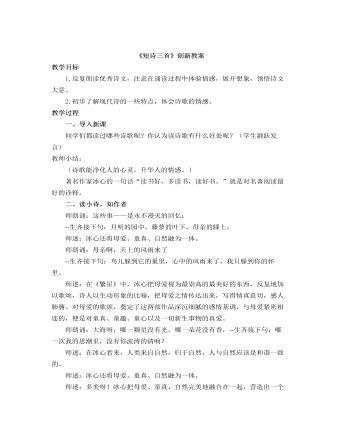
部编人教版四年级下册《 短诗三首》创新教案
教学目标1.反复朗读优秀诗文,注意在诵读过程中体验情感,展开想象,领悟诗文大意。2.初步了解现代诗的一些特点,体会诗歌的情感。教学过程一、导入新课同学们都读过哪些诗歌呢?你认为读诗歌有什么好处呢?(学生踊跃发言)教师小结:(诗歌能净化人的心灵,升华人的情感。)著名作家冰心的一句话“读书好,多读书,读好书。”就是对名著阅读最好的诠释。
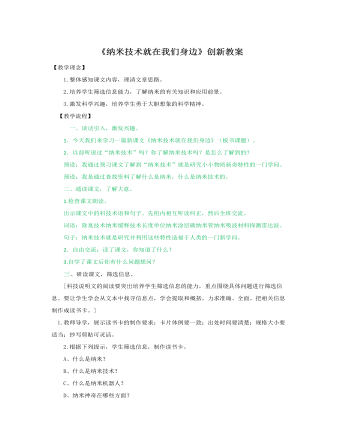
部编人教版四年级下册《 飞向蓝天的恐龙》创新教案
【教学理念】 1.整体感知课文内容,理清文章思路。2.培养学生筛选信息能力,了解纳米的有关知识和应用前景。3.激发科学兴趣,培养学生勇于大胆想象的科学精神。【教学流程】一、谈话引入,激发兴趣。1.今天我们来学习一篇新课文《纳米技术就在我们身边》(板书课题)。2.以前听说过“纳米技术”吗?你了解纳米技术吗?是怎么了解到的?预设:我通过预习课文了解到“纳米技术”就是研究小小物质新奇特性的一门学问。预设:我是通过查找资料了解什么是纳米,什么是纳米技术的。二、通读课文,了解大意。1.检查课文朗读。出示课文中的科技术语和句子。先组内相互听读纠正,然后全班交流。词语:除臭技术纳米缓释技术长度单位纳米涂层碳纳米管纳米吸波材料探测雷达波。句子:纳米技术就是研究并利用这些特性造福于人类的一门新学问。2.自由交流:读了课文,你知道了什么?3.自学了课文后你有什么问题想问?
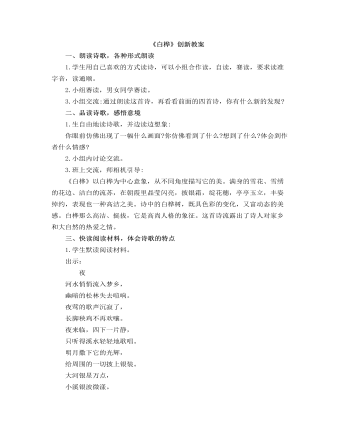
部编人教版四年级下册《白桦》创新教案
一、朗读诗歌,各种形式朗读1.学生用自己喜欢的方式读诗,可以小组合作读,自读,赛读,要求读准字音,读通顺。2.小组赛读,男女同学赛读。3.小组交流:通过朗读这首诗,再看看前面的四首诗,你有什么新的发现?二、品读诗歌,感悟意境1.生自由地读诗歌,并边读边想象:你眼前仿佛出现了一幅什么画面?你仿佛看到了什么?想到了什么?体会到作者什么情感?2.小组内讨论交流。3.班上交流,师相机引导:《白桦》以白桦为中心意象,从不同角度描写它的美。满身的雪花、雪绣的花边、洁白的流苏,在朝霞里晶莹闪亮,披银霜,绽花穗,亭亭玉立,丰姿绰约,表现也一种高洁之美。诗中的白桦树,既具色彩的变化,又富动态的美感。白桦那么高洁、挺拔,它是高尚人格的象征。这首诗流露出了诗人对家乡和大自然的热爱之情。
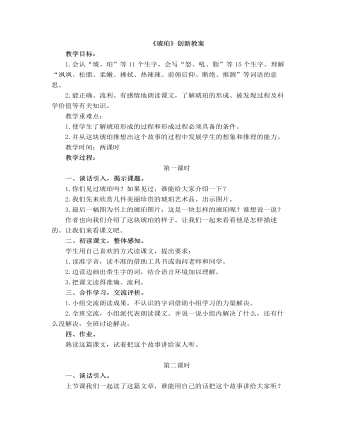
部编人教版四年级下册《琥珀》创新教案
教学重难点:1.使学生了解琥珀形成的过程和形成过程必须具备的条件。2.并从这块琥珀推想出这个故事的过程中发展学生的想象和推理的能力。教学时间:两课时教学过程:第一课时一、谈话引入,揭示课题。1.你们见过琥珀吗?如果见过,谁能给大家介绍一下?2.我们先来欣赏几件美丽珍贵的琥珀艺术品。出示图片。3.最后一幅图为书上的琥珀图片:这是一块怎样的琥珀呢?谁想说一说?作者也向我们介绍了这块琥珀的样子。让我们一起来看看他是怎样描述的。让我们来看课文吧。二、初读课文,整体感知。学生用自己喜欢的方式读课文,提出要求:1.读准字音,读不准的借助工具书或询问老师和同学。2.边读边画出带生字的词,结合语言环境加以理解。3.把课文读得准确、流利。
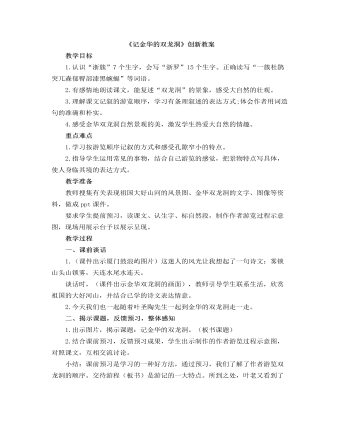
部编人教版四年级下册《记金华的双龙洞》创新教案
教学目标1.认识“浙簇”7个生字,会写“浙罗”15个生字。正确读写“一簇杜鹃突兀森郁臀部漆黑蜿蜒”等词语。2.有感情地朗读课文,能复述“双龙洞”的景象,感受大自然的壮观。3.理解课文记叙的游览顺序,学习有条理叙述的表达方式;体会作者用词造句的准确和朴实。4.感受金华双龙洞自然景观的美,激发学生热爱大自然的情趣。重点难点1.学习按游览顺序记叙的方式和感受孔隙窄小的特点。2.指导学生运用常见的事物,结合自己游览的感觉,把景物特点写具体,使人身临其境的表达方式。教学准备教师搜集有关表现祖国大好山河的风景图、金华双龙洞的文字、图像等资料,做成ppt课件。要求学生提前预习,读课文、认生字、标自然段,制作作者游览过程示意图,现场用展示台予以展示呈现。

部编人教版四年级下册《文言文二则》创新教案
三、教学过程(一)导入新课:1.师:同学们,中国是世界上历史最悠久的国家之一,在漫漫的历史长河中,产生了大量的神话传说和历史故事,后来人们把这些神话传说和历史故事加以锤炼,便形成了许多脍炙人口的成语。下面,让我们一起来感受下中华语言文化的精华,背诵下我们积累的成语。)2.学生起头,背诵成语接龙。(在今后的学习中我们还会积累更多的成语,希望同学们继续保持这种学习精神。)3.导入:成语是我国语言文化的精华,它们有的庄重严肃,有的机智幽默,而且大多数的成语背后都有一个生动的故事。今天老师给大家带来个有趣的成语故事,大家想不想看?这个成语故事的名字叫做“铁杵成针”。(板书课题:铁杵成针)不过,老师有个要求,希望同学们能带着这些问题认真去观看。
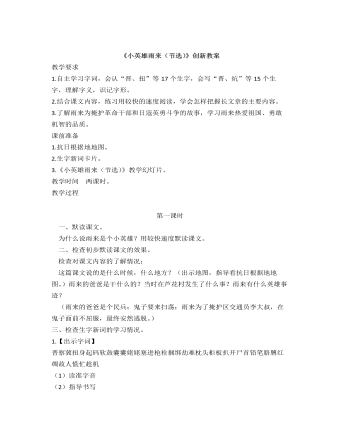
部编人教版四年级下册《小英雄雨来》创新教案
(二)提问:夜校的学习条件怎样?雨来在夜校里受到什么教育?默读第二段。指导朗读:“我们是中国人,我们爱自己的祖国。”“我们——是——中国人,我们——爱——自己的——祖国。”讨论段意和小标题。(段意:雨来上夜校,受到爱国主义教育。)(小标题:“雨来上夜校。”)(三)学习第三段。默读课文,提问:这段主要说了几层意思?学生默读课文,小组交流,展示如下:(两层意思:第一层从“有一天”至“只从街上传来一两声狗叫”,主要写鬼子开始扫荡了;第二层从“第二天”至这段结束,主要写雨来为掩护交通员李大叔,被鬼子捆绑起来了。)指导朗读第二层。重点朗读:“他抬头一看,是李大叔。”“咦!这是什么时候挖的洞呢?”“把缸搬回原地方。你就快到别的院里去,对谁也不许说。”讨论段意和小标题。段意:(雨来为掩护交通员李大叔,被鬼子捆绑起来了。)(小标题:“雨来掩护李大叔”。)
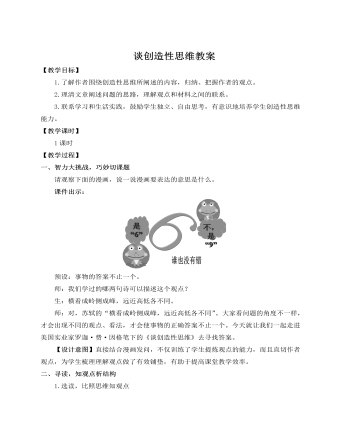
人教部编版语文九年级上册谈创造性思维教案
《谈创造性思维》是一篇自读课文,浅显易懂,这不仅是因为作者写作思路清晰,还在于作者巧妙运用了举例论证的写法。作者为了证明知识与创造力之间的关系,举了谷登堡将葡萄压榨机和硬币打制器组合起来发明了印刷机和排版术的事例,还举了罗兰·布歇内尔发明交互式的乒乓球电子游戏的事例,具体而又确凿地阐明了事理。但两者有所侧重,前者侧重于“活用知识的态度和意识”,后者侧重于“尝试”,这为我们写作议论文提供了典型的写作方向:举例,既要注重事件的典型性,也要重视事件的差异性,使论证更有说服力。[疑难探究]课文说:“区分一个人是否拥有创造力,主要根据之一是,拥有创造力的人留意自己细小的想法。”为什么这样说?从社会发展史上可以看出,伟人们的天才的创造,往往是从细小的想法开始的:牛顿创立万有引力学说,是从苹果落地的小想法开始的;瓦特发明蒸汽机,是从水壶里的水开了,水汽顶着壶盖的小想法开始的;法国大数学家庞加莱,说他关于数学的发明,大半是从“无意中得出来的细小的想法”开始的。
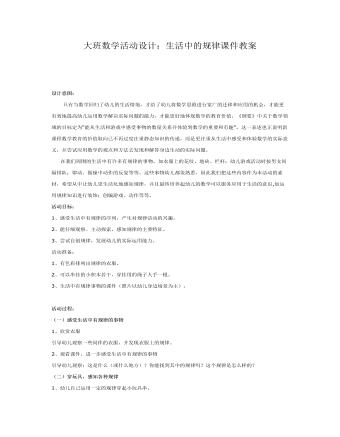
大班数学活动设计:生活中的规律课件教案
活动目标:1、感受生活中有规律的序列,产生对规律活动的兴趣。2、能仔细观察、主动探索,感知规律的主要特征。3、尝试自创规律,发展幼儿的实际运用能力。活动准备:1、有色彩排列出规律的衣服。2、可以串挂的小积木若干,穿挂用的绳子人手一根。3、生活中有规律事物的课件(照片以幼儿身边场景为主)。

中班主题活动课件教案:我升中班了
二.预设目标1.学习用适当的方式表达自己的情绪,心情愉快的参加各类活动。2.学习使用筷子,安静愉快的进餐,养成不挑食,不偏食的习惯。3.能耐心倾听别人讲话,理解他人说话意思,并做积极的应答。4.学习使用恰当的礼貌用语与人交往。5.乐于参与集体活动,体验与老师、同伴共处的快乐,喜欢老师、小朋友。6.知道自己的兴趣和能力,积极参与活动,体验成功。7.亲近周围环境中的动植物,了解其生长条件,懂得关心动植物。8、鼓励幼儿大胆的选择自己喜欢的图案、颜色表达自己的情感,并有条理的进行剪、画、贴粘等活动。
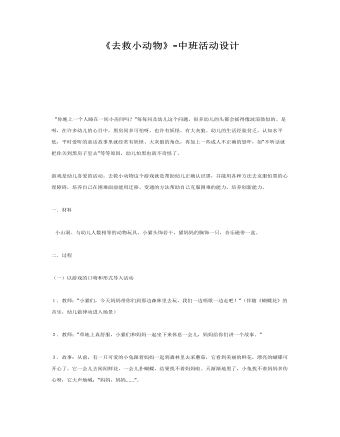
中班主题课件教案:《去救小动物》-中班活动设计
一.材料 小山洞、与幼儿人数相等的动物玩具,小猫头饰若干,猫妈妈的胸饰一只,音乐磁带一盒。二.过程(一)以游戏的口吻和形式导入活动1.教师:“小猫们,今天妈妈带你们到那边森林里去玩,我们一边唱歌一边走吧!”(伴随《蝴蝶花》的音乐,幼儿做律动进入场景)2.教师:“草地上真舒服,小猫们和妈妈一起坐下来休息一会儿,妈妈给你们讲一个故事。”3.故事:从前,有一只可爱的小兔跟着妈妈一起到森林里去采蘑菇,它看到美丽的鲜花,漂亮的蝴碟可开心了。它一会儿去闻闻鲜花,一会儿扑蝴蝶,结果找不着妈妈啦。天渐渐地黑了,小兔找不着妈妈多伤心呀,它大声地喊:“妈妈,妈妈……”。

中班主题课件教案:中班探索活动“蛇”
春的来临,使大地万物复苏,春暖花开。孩子们开始收集自然角了,最近每天都有孩子带来各种自然角的物品,如:水果、干果、盆景等等。一个星期一的早上,黄灏小朋友手里拎着一个饲养盒兴冲冲的来到了教室,大声的喊着:“老师、老师,我带来了一条蛇”。他的喊声吸引了许多孩子,他们一起挤着看这条蛇。有几个女孩子似乎比较胆小,抱着双臂说:“我最怕蛇了,会咬人的”。但好奇心又驱使着她们追随着看热闹,我悄悄的走过去,倾听着孩子们的议论,曹振飞说:“蛇的舌头和我们人的舌头是不一样的”。刘景超说:“我看过动物世界,有的蛇有毒,有的蛇没有毒的”。黄铭均说:“蛇身上的花纹是不一样的”。王中天说:“听说蛇还会脱皮呢”。徐雨航说:“蛇没有脚它怎么走的呢?”。周祖豪说:“我还吃过蛇肉呢”等等。我从孩子这些谈话中对他们的经验有了一定的了解,在获取这些信息的基础上,初步拟订了一个关于蛇的主题网络图,图中实线部分是孩子们实际活动内容,虚线为教师预定内容。 场景一:蛇的趣闻 确定蛇的主题后,我开始与孩子们一起收集有关蛇的资料,短短的几天里孩子们通过自己的方法收集到了一些有关蛇 书籍和VCD,还从网上下载了一些有关蛇的资料,其中黄铭均带的一本书《有趣的蛇》最受孩子们的关注了,他们没想到蛇与人类有如此密切的关系,书上记载着有一种双头蛇、会唱歌的蛇、会跳舞的蛇、会看门的蛇、会当保姆的蛇、会灭火的蛇、还可以用活蛇做耳环、做门帘等等。孩子们真是太激动了,他们迫不及待的想用自己的方式方法表现出来,有的孩子选择了用泥工捏各种各样有趣的蛇,有的借用废旧材料、积木等拼搭蛇洞、蛇桥等,选择最多的是绘画,许多孩子一边画一边嘴里唠叨着,忽而沉思,忽而又挥舞着手中的画笔。不一会,一幅幅生动有趣的画,呈现在了我的面前。下面是部分孩子作品的解读。王中天: 有一条蛇,它想去爬树可是爬不上去,后来两条蛇一起爬了上去,房子的门帘也是许多蛇串成的”。夏 炎: 许多蛇在一起比赛谁跑的快,“预备起”它们一起跑了起来,跑的一条条累的伸长了舌头,有一条蛇跑不动了,就停下来休息。王 炎: 有一天,有一个小朋友要过河,没有桥,怎么办呢?一条蛇看见了就游了过来架在河上变成了一座桥,小朋友就过河了。还有条蛇盘在那儿晒太阳。周秋妤:这是一条毒蛇,它在吃草,吃饱了在草丛里了生了5个蛇蛋。俞琦涵:有一天太阳下山了,蛇也要回家了,在散步时听见蛇宝宝在蛋里哭,它们就在旁边保护它们了。 刘明玉:这个人家养了两条蛇,看见下雨了,地上有水就变成一条路,让大家从它身上过去,另一条蛇站在门口看门,等着主人回家。在解读孩子们的作品时,我始终被孩子们的作品深深地感动着,仿佛自己走进了孩子那童话般的世界,与孩子们一起成长着、快乐着,对一切充满了美好的遐想。

中班主题课件教案:方案活动旋转的陀螺
孩子们口中常说的小龙就是里面的角色。既然孩子们对玩陀螺那么感兴趣,又有着丰富的经验。我想可以通过这样的活动让孩子们在玩中发现问题,解决问题,掌握科学知识,激发孩子们探索科学知识的兴趣,提高孩子们探究科学的能力。活动一:谈话活动:我最喜欢的陀螺目标:1、认识陀螺的外型特征,知道陀螺的一些种类。2、能说出自己喜欢陀螺的原因,愿意在集体面前大胆表达自己的想法。准备:幼儿带来自己喜欢的陀螺过程:1、(出示陀螺)激发幼儿学习的兴趣老师提问:这是什么?你玩过这样的陀螺吗?2、你还玩过什么样的陀螺?徐晟:我玩过拧的陀螺,尤志浩:我玩过木头的陀螺,也叫打不死陀螺;周杰:我玩过装电池有按扭的陀螺,邵未龙:我见过遥控陀螺,很厉害的;周舟:我玩过有发条的陀螺……(评析:这样的谈话可以让孩子了解到陀螺的种类有很多:木头的,塑料的,拧的,有发条的,自动的。)3、你喜欢什么样的陀螺?为什么?郁幸娴:我喜欢音乐发光战斗陀螺,因为它会发出火星;戚奔:我喜欢白虎陀螺,因为它很厉害,可以打败龙陀螺;吕新炜:我喜欢大的陀螺,因为它可以转很长的时间;邵未龙:我喜欢小的陀螺,因为它转的速度很快;邹蓉蓉:我喜欢牵牛陀螺,因为它很好玩;蒋钰:我喜欢铁的陀螺,因为不容易坏……(评析:孩子对陀螺真的是爱不释手,又有过玩的经验,所以在讲的时候能充分表达自己的理由。由于孩子的知识能力有差异,所以喜欢的原因也各不相同。由此可见,我们的谈话内容一定要围绕孩子已有的经验进行。)4、如果让你设计一个陀螺,你想设计一个什么样的陀螺呢? 我想设计一个彩色的陀螺,我想设计一个喷火的陀螺,我想设计一个很厉害的陀螺,我想要一个会飞的陀螺……(评析: 从孩子们的谈话中可以看出他们喜欢陀螺的原因很多,有的是因为动画中的角色厉害他就喜欢那个陀螺,有的是因为转得快,有的是因为转得稳,也有的是因为色彩或图案漂亮。通过与同伴的交流小朋友对陀螺的种类也多了一些了解。那为什么摇摇晃晃旋转的陀螺不会倒下,为什么陀螺旋转的时候会有的快有的慢呢,其中有什么奥秘呢?)
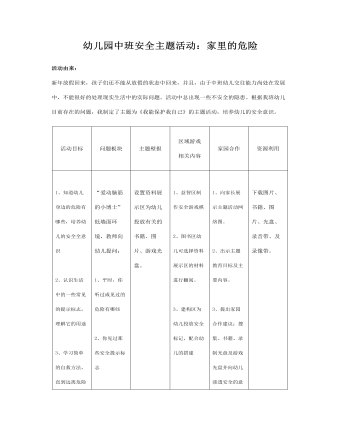
中班安全主题活动教案:家里的危险
1、知道幼儿身边的危险有哪些,培养幼儿的安全全意识2、认识生活中的一些常见的提示标志,理解它的用途3、学习简单的自救方法,直到远离危险

中班美术活动——救生圈课件教案
培养幼儿的自我保护意识。活动准备:各种粘贴材料、蜡笔、各色颜料。像救生圈形状的作画纸。 活动室布置:收集各种款式的救生圈活动过程:一、欣赏夏天里,天气很热,有什么办法使自己凉快?(幼儿泛讲)欣赏活动室四周的救生圈,引导幼儿观察这些救生圈上的各种图案花纹。向幼儿介绍:夏天去游泳能使自己凉快,但不能一个人去游泳,必须在大人的带领下去,并要套好救生圈,游泳时也要文明游泳。
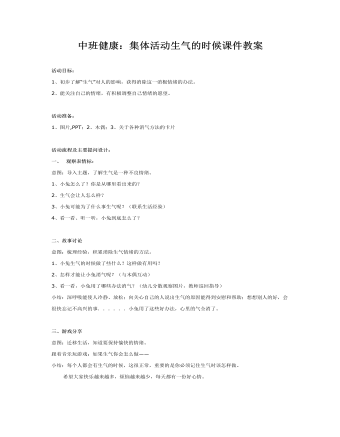
中班健康:集体活动生气的时候课件教案
2、能关注自己的情绪,有积极调整自己情绪的愿望。 活动准备:1、图片,PPT;2、木偶;3、关于各种消气方法的卡片 活动流程及主要提问设计:一、 观察表情标: 意图:导入主题,了解生气是一种不良情绪。1、小兔怎么了?你是从哪里看出来的?2、生气会让人怎么样?3、小兔可能为了什么事生气呢?(联系生活经验)4、看一看、听一听,小兔到底怎么了?
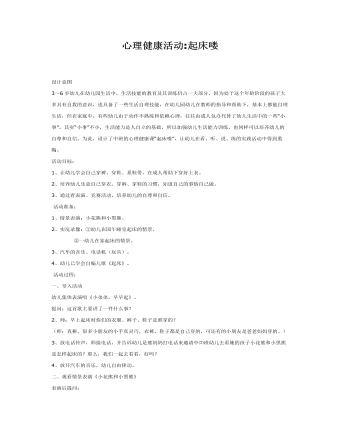
中班健康:心理健康活动起床喽课件教案
活动目标: 1、让幼儿学会自己穿裤、穿鞋、系鞋带,在成人帮助下穿好上衣。 2、培养幼儿乐意自己穿衣、穿裤、穿鞋的习惯,知道自己的事情自己做。 3、通过看表演、竞赛活动,培养幼儿的自尊和自信。 活动准备: 1、情景表演:小花熊和小黑熊。 2、实况录像:①幼儿在园午睡室起床的情景。 ②一幼儿在家起床的情景。 3、汽车的音乐、电话机(玩具)。 4、幼儿已学会自编儿歌《起床》。 活动过程: 一、导入活动幼儿集体表演唱《小弟弟,早早起》。 提问:这首歌主要讲了一件什么事? 2、师:早上起床时你们的衣服、裤子、鞋子是谁穿的? (师:真棒,很多小朋友的小手真灵巧,衣裤、鞋子都是自己穿的,可还有的小朋友是爸爸妈妈穿的。)

中班艺术活动:歌唱《理发店》课件教案
活动准备: 1、角色表演用的自制剪刀和镜子。 2、活动前请家长带幼儿到理发店剪头发、理发、体验理发的过程。活动过程: 一、以谈话引题。 “夏天到了,天气变得越来越热,小朋友也需要经常到理发店里去理发,你们知道理发店里是谁帮我们理发的?”(叔叔阿姨) “他们用什么来理发?”(幼儿自由回答) (出示剪刀操作)“听,见到发出什么声音,用小嘴巴来学学!”(咔嚓咔嚓) “我们一起来说说,咔嚓咔嚓……” 二、熟悉歌词,学说歌词。 1、教师念歌词,幼儿熟悉。 “现在就让我来说说发生在理发店的故事吧!” “理发店的叔叔阿姨,咔擦,咔嚓,拿着剪刀剪呀剪 呀,咔擦咔擦,剪得非常认真,不一会儿,头发剪好了,叔叔 阿姨还高兴得对顾客说:‘哎,已剪好了呀!’瞧一瞧顾客的头发,头发剪得多漂亮多漂亮!”
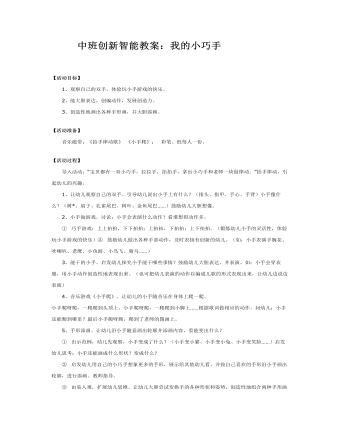
中班创新智能教案:我的小巧手
2、能大胆表达,创编动作,发展创造力。3、创造性地画出各种手形画,并大胆添画。【活动准备】 音乐磁带:《拍手律动歌》《小手爬》; 彩笔、纸每人一份。【活动过程】 导入活动:“宝贝都有一双小巧手,拉拉手,拍拍手,拿出小巧手和老师一块做律动。”拍手律动,引起幼儿的兴趣。1、让幼儿观察自己的双手。引导幼儿说出小手上有什么?(指头、指甲、手心、手背)小手像什么?(树*、扇子、孔雀尾巴、树叶、金鱼尾巴……)鼓励幼儿大胆想像。2、小手做游戏。讨论:小手会表演什么动作?看谁想得动作多。① 巧手游戏:上上拍拍,下下拍拍;上拍拍,下拍拍;上下拍拍。(锻炼幼儿小手的灵活性,体验玩小手游戏的快乐)② 鼓励幼儿做出各种手部动作,及时表扬有创新的幼儿。(如:小手表演手腕花、吹喇叭、老鹰、小鱼游、小鸟飞、骑马……)3、能干的小手。启发幼儿探究小手能干哪些事情?鼓励幼儿大胆表达、并表演。如:小手会穿衣服,用小手动作创造性地表现出来。(也可把幼儿表演的动作以编成儿歌的形式表现出来,让幼儿边说边表演)
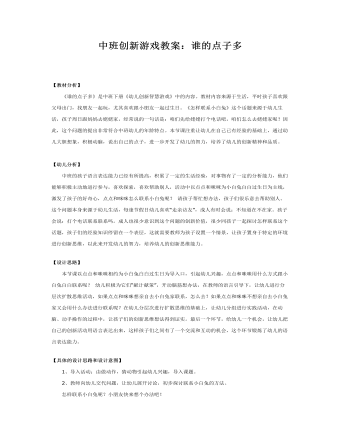
中班创新游戏教案:谁的点子多
【幼儿分析】 中班的孩子语言表达能力已经有所提高,积累了一定的生活经验,对事物有了一定的分析能力,他们能够积极主动地进行参与,喜欢探索,喜欢帮助别人,活动中以点点和咪咪为小白兔白白过生日为主线,激发了孩子的好奇心,点点和咪咪怎么联系小白兔呢?请孩子帮忙想办法,孩子们很乐意去帮助别人。这个问题本身来源于幼儿生活,每逢节假日幼儿喜欢“走亲访友”,成人有时会说:不知道在不在家。孩子会说:打个电话联系联系吗。成人也很少意识到这个问题的创新价值,很少同孩子一起探讨怎样联系这个话题,孩子们的经验知识停留在一个表层,这就需要教师为孩子设置一个情景,让孩子置身于特定的环境进行创新思维,以此来开发幼儿的智力,培养幼儿的创新思维能力。【设计思路】 本节课以点点和咪咪相约为小白兔白白过生日为导入口,引起幼儿兴趣,点点和咪咪用什么方式跟小白兔白白联系呢?幼儿积极为它们“献计献策”,开动脑筋想办法,在教师的语言引导下,让幼儿进行分层次扩散思维活动,如果点点和咪咪想亲自去小白兔家联系,怎么去?如果点点和咪咪不想亲自去小白兔家又会用什么办法进行联系呢?在幼儿分层次进行扩散思维的基础上,让幼儿分组进行实践活动,在动脑、动手操作的过程中,让孩子们的创新思维想法得到证实。最后一个环节,给幼儿一个机会,让幼儿把自己的创新活动用语言表达出来,这样孩子们之间有了一个交流和互动的机会,这个环节锻炼了幼儿的语言表达能力。


